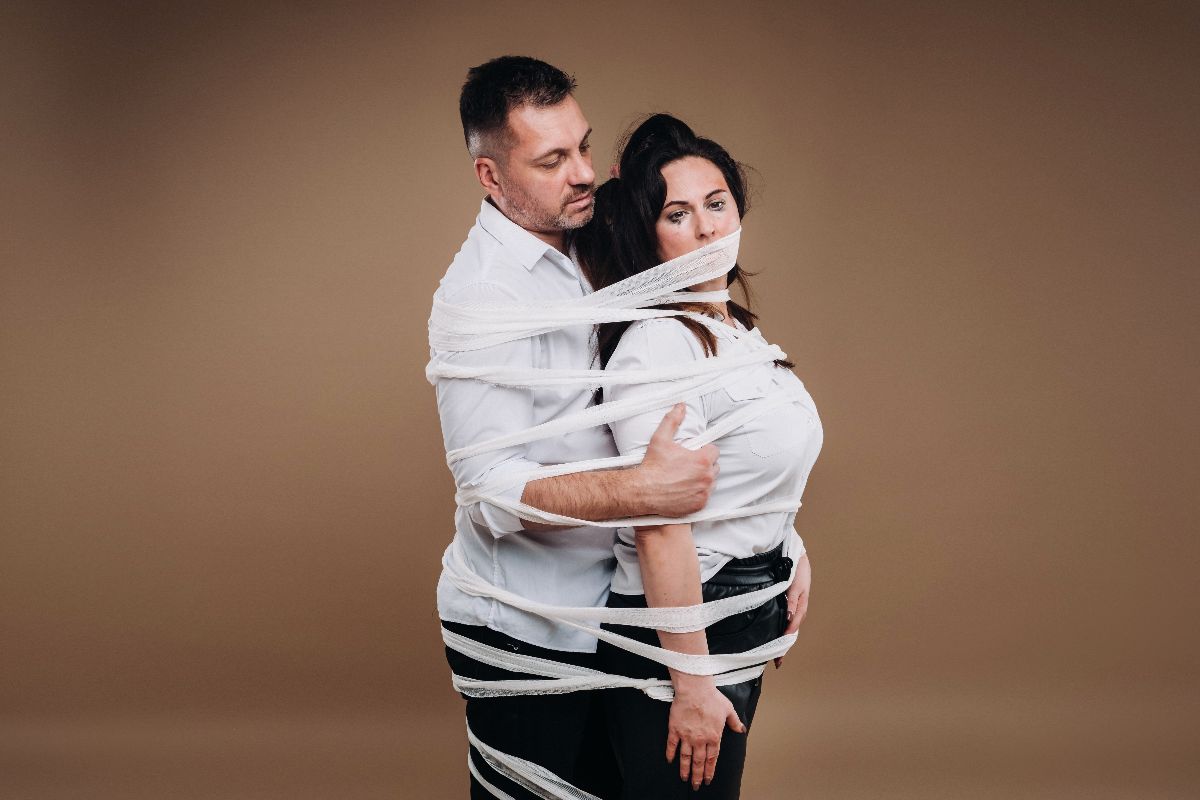Relationships can be a source of immense joy and satisfaction. Finding someone to share our lives, dreams, and challenges with can be a transformative experience.
Love, that powerful force that unites us with another soul but at the same time can also lead us to a dead end: losing our identity.
Have you ever felt like you've become someone different in your relationship? Why do we stop being ourselves when we are in a relationship? We will explore the causes behind this transformation and offer strategies to keep our identity intact while enjoying a loving relationship.
The reasons we stop being ourselves in a relationship are complex and multifaceted. Below, we present some of the most common factors that contribute to this phenomenon:
Fear of Rejection
Fear of rejection is one of the main reasons why people change their behavior in a relationship. This fear can be so deep that it leads us to modify our personality and actions to ensure that our partner accepts and loves us. This need for acceptance can cause us to suppress our true opinions, desires, and behaviors, all in an effort to avoid rejection.
The fear of rejection is often rooted in past experiences. Perhaps in a previous relationship we were rejected for being authentic, or perhaps our life experiences have taught us that we must conform to be loved. This fear can lead us to be overly complacent, avoid conflict at all costs, and constantly adapt to our partner's expectations, sacrificing our authenticity in the process.
Some examples include:
- Hide our true feelings or interests: For fear of being judged or rejected, we can choose to hide aspects of our personality that we believe would not be accepted by our partner.
- Change our appearance or behavior: To adapt to what we think our partner wants, we can modify the way we dress, speak or behave in general.
- Avoid conflict: For fear of hurting our partner's feelings or damaging the relationship, we can avoid expressing our opinions or real needs, repressing emotions and desires.

Low self-esteem
Low self-esteem is another fundamental reason why we can lose our identity in a relationship. If we don't value ourselves, it's easy to fall into the trap of thinking we need to change to be loved. This lack of self-acceptance can lead us to become overly dependent on our partner for validation and to adapt our behavior to earn their approval.
In a relationship, this can lead us to:
- Relying excessively on our partner's validation: We base our self-esteem on our partner's opinion and affection, losing sight of our own intrinsic value.
- Accept disrespectful or hurtful behavior: For fear of losing our partner, we tolerate attitudes or actions that do not agree with our values or that make us feel bad.
- Giving up our dreams or personal goals: To please our partner or avoid conflicts, we sacrifice our own aspirations and desires.
Need for Approval
From a young age, many of us seek approval from the people around us. In a relationship, this need can lead us to behave in ways that are not authentic. We want to be validated, accepted, and loved, and we often believe that the only way to achieve this is by adapting to our partner's expectations.
This constant search for approval can be exhausting and, over time, can lead to a disconnection from our true needs and desires. This need can manifest itself in various ways:
- Constantly adapt to our partner's expectations: We modify our behavior, tastes or even opinions to adjust to what we believe our partner expects of us.
- Seek acceptance from common friends or family: We prioritize the approval of the shared social circle over our own authenticity.
Lack of communication
Lack of effective communication in a relationship can be a crucial factor contributing to the loss of identity. Without open and honest communication, it is easy to fall into the trap of hiding parts of ourselves to avoid conflict or misunderstanding. Communication is essential to expressing our needs, desires, and boundaries, and without it, it is easy to feel disconnected and not understood.
Lack of communication can lead to misunderstandings and built-up resentments. If we don't feel comfortable expressing our true opinions and feelings, we can begin to hold back, adapting to what we think our partner wants to hear. Over time, this lack of authenticity can create an emotional distance between us and our partner, and also between us and our true identity.
The lack of effective communication can contribute to the loss of our identity:
- Difficulty expressing our true feelings: We repress ourselves for fear of hurting our partner or starting a conflict.
- Misinterpretations and misunderstandings: Lack of clarity in communication can lead to confusion and our partner not understanding our needs or desires.
- Avoid difficult or conflictive topics: We postpone important conversations for fear of negative reactions or consequences.

The Myth of "We"
The “we” myth suggests that we must merge completely with our partner, losing our individuality in the process. Although closeness and togetherness are important aspects of a relationship, it is crucial to maintain a sense of "I" separate from the "we." Complete fusion with our partner can lead to a loss of identity and a feeling of being trapped.
It is natural to want to share experiences and create a life together with our partner, but this should not mean sacrificing our individuality. Maintaining personal interests and activities is essential to preserving our identity. In doing so, we not only maintain a sense of self, but also enrich the relationship by bringing unique experiences and perspectives.
The reality is very different:
- A healthy relationship is based on the union of two unique beings, not on the cancellation of one by the other.
- It is important to maintain a sense of “I” separate from “we” to preserve our autonomy and authenticity.
- Total fusion can lead to emotional dependency, resentment, and loss of identity.
The Search for Acceptance and Love
The search for acceptance and love drives us to make personal sacrifices. We want our partner to love and accept us, and sometimes we believe that the only way to achieve this is by changing aspects of ourselves that we don't really want to change. This desire to be accepted can be so strong that it leads us to compromise our authenticity.
In our search for acceptance and love, it is easy to lose sight of who we really are. We can begin to make concessions that, although initially seem small, can accumulate over time and lead us to feel that we have lost our essence. It is essential to remember that a healthy relationship does not require us to sacrifice our identity, but rather allows us to be authentic while sharing our lives with another person.
We forget that true love does not ask for sacrifices, but rather embraces us as we are:
- We give up our passions and interests: To dedicate more time to the relationship or please our partner, we put aside activities that fulfill us and define us as people.
- We adopt opinions or beliefs that are not ours: To avoid conflicts or gain the approval of our partner, we modify our ideas and convictions.
- We become emotional chameleons: We adapt our emotions and reactions to adjust to what we believe our partner expects of us.
The Influence of Social Expectations
Social and cultural expectations can put significant pressure on how we behave in a relationship. Traditional norms about how couples should behave can lead us to assume roles or behaviors that do not reflect our true nature. These expectations can contribute to the loss of our identity.
Social expectations can dictate how we should act, what roles we should take, and what behaviors are acceptable in a relationship. Meeting these expectations can make us feel like we have to fit a specific mold, sacrificing our true passions and interests in the process. It is important to question these norms and create a relationship that reflects our authentic personalities and values.
In the context of relationships, this can lead us to:
- Follow traditional gender roles: We adopt behaviors and expectations that are associated with our gender, even if they do not fit our personality or desires.
- Comparing ourselves to other couples: We idealize other people's relationships and feel pressured to achieve a level of success or happiness that does not necessarily fit our own reality.
- Ignoring our own needs and values: To fit into social expectations, we sacrifice important aspects of our identity and well-being.
Complacency and Lack of Limits
Complacency and a lack of clear boundaries lead us to say “yes” when we want to say “no.” By not setting healthy boundaries, we find ourselves adopting behaviors and habits that are not authentic to us, diluting our true identity. Complacency may be a way to avoid conflict, but in the long term, it can result in resentment and loss of identity.
Setting boundaries is essential to maintaining our individuality in a relationship. Clear boundaries allow us to communicate our needs and wants effectively, and help us maintain a sense of control over our lives. Learning to set clear boundaries is crucial to protecting our individuality and cultivating a healthy relationship:
- We become complacent: To avoid conflicts or hurting our partner, we accept plans, activities or decisions that we don't like or that go against our principles.
- We lose the ability to say "no": We feel guilty or selfish when expressing our needs or desires, allowing our partner to make decisions for us.
- Resentment and frustration: Lack of boundaries can generate long-term resentment and frustration, damaging the relationship and our own self-esteem.

How to Recover and Maintain Our Identity
Self-exploration and Self-awareness
Spending time on self-exploration is crucial to maintaining our identity in a relationship. Reflecting on our passions, values and desires helps us reaffirm who we are and what we want. Practicing self-awareness allows us to identify when we are acting authentically and when we are over-accommodating to our partner.
Self-exploration may include activities such as journaling, meditating, or participating in therapy. These practices help us connect with our inner feelings and thoughts, and better understand our needs and desires. By doing so, we can make more informed and authentic decisions about how we want to behave in our relationship.
Open Communication
Maintaining open and honest communication with our partner about our needs and limits is essential. Sharing our authentic thoughts and feelings strengthens the relationship and allows us to maintain our individuality. Effective communication is the foundation of a healthy relationship and allows us to express who we really are.
The open communication involves actively listening to our partner and being honest about our own needs. This may require bravery and vulnerability, but it is essential to building a relationship based on authenticity and mutual respect. By expressing our true opinions and feelings, we foster an environment of trust and understanding in the relationship.
Personal Space
Making time for individual activities and friends outside of the relationship fosters a sense of independence and reinforces our identity. Maintaining hobbies and personal interests helps us preserve our essence and avoid the feeling of being trapped in the relationship.
Personal space does not mean emotional distancing, but rather a recognition that both partners need time and space to grow as individuals. By cultivating our personal interests, we not only enrich our own lives, but we also bring new experiences and perspectives to the relationship, thereby strengthening the bond with our partner.
Mutual Acceptance
It is important to be in a relationship where both parties accept and celebrate each other as they are. This creates an environment where we don't feel the need to change to be loved. Mutual acceptance allows us to be authentic and maintain our identity while sharing our life with our partner.
Mutual acceptance involves recognizing and respecting the differences between us and our partner. Instead of trying to change each other, we celebrate their unique qualities and value what each person brings to the relationship. This attitude of acceptance and mutual respect is essential for a healthy and long-lasting relationship.
Establishment of Limits
Learn to say "no" and set clear boundaries. Defining what is acceptable and what is not in the relationship will help you maintain your sense of self. Healthy boundaries allow us to protect our individuality and ensure that our needs and desires are respected.
Setting boundaries can be difficult at first, especially if we are used to pleasing others. However, it is an essential skill to maintain our authenticity in a relationship. Clear boundaries allow us to communicate our expectations and needs effectively, and help us maintain a healthy balance between our individual identity and our life as a couple.
Stopping being ourselves in a relationship is a common phenomenon, but not inevitable. By understanding the reasons behind this trend and taking proactive steps to maintain our authenticity, we can enjoy healthier, more satisfying relationships. At the end of the day, a true, lasting relationship does not require us to sacrifice our identity, but rather allows us to flourish together as unique and complete individuals. Staying true to ourselves while connecting deeply with another person is the ideal balance for a happy and meaningful relationship.


















Comentarios